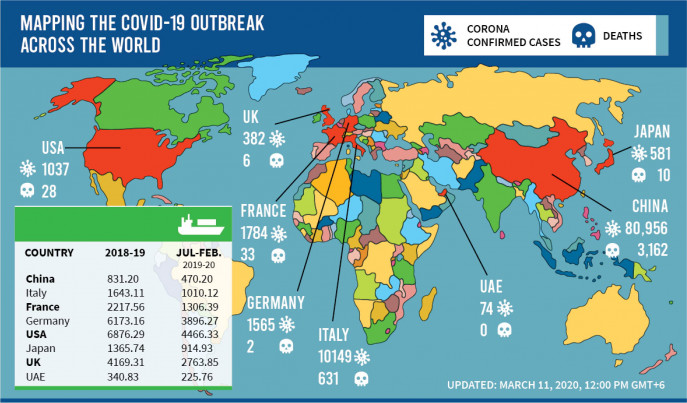SAMI
Published:2020-03-12 16:42:36 BdST
Virus-struck Europe poses new risk to exports
FT ONLINE
With rapidly depleting stocks of raw materials, the outbreak of coronavirus in Bangladesh's major markets -- Europe, America and Japan -- local exporters are growing increasingly worried about their business futures.
Many buyers in these countries, which account for 70 percent of Bangladesh's exports, have shut down their offices in the face of rapidly spreading infection of the deadly virus.
Swedish retail giant H&M, which is the biggest buyer of Bangladesh-made apparels, has ordered its Dhaka office staff to work from home and not to do any inspection at factories at the moment after the detection of three Covid-19 patients in the country.
Every year, H&M sources over $3 billion worth of apparel items from Bangladesh.
"Spread of the virus in our major export destinations have already become a big concern," said Fazlul Hoque, managing director of Plummy Fashions, a leading knitwear manufacturer and exporter.
Hoque, also a former president of the Bangladesh Knitwear Manufacturers and Exporters' Association, is concerned as the problem has shifted to buyers' side from supply chain disruption.
"We tried for alternative markets to keep our supply chain intact, but we have nothing to do when buyers stop sourcing," he said.
Another exporter, requesting not to be named, said a big buyer in New York, which is the largest hub for Bangladesh's garments in America, has shut down his office after the spread of the virus there.
Syed M Tanvir, a director of Pacific Jeans Ltd, which is a leading exporter of denim products, said some of his orders have already been cancelled because of delay in delivery.
It is not only garments that accounted for Bangladesh's 84 percent export worth nearly $40 billion last fiscal year, other sectors, be they footwear or bicycle, have also been feeling the pinch of the virus.
Nasir Khan, chairman and managing director of Jennys Shoes, one of the pioneers in exporting of footwear, said his exports have almost been stopped.
But he is more concerned with the future business as this is the time for getting orders for the next season.
"Italians lead the global footwear market as experts and agents and the rapid outbreak of the coronavirus there has not only affected our business in Italy, but also in other countries," said Khan.
Bangladesh exported leather footwear worth $608 million in 2018-19. The first eight months' figure till February of the current year showed the sector is already in strain with over 11 percent negative growth in its export.
Apex Footwear that exports to Europe, North America and Japan is also concerned with its future business.
"If the products we have shipped this year are not sold, stocks will pile up and the buyers will cut their orders for the next season," said the official of Apex that accounts for around 15 percent of Bangladesh's total annual footwear export.
The coronavirus has also impacted bicycle exports to the European countries, the main market for Bangladesh-made cycle.
"Buyers in Europe are concerned and going slow," said Luthful Bari, director, operations of Meghna Group.
He also shared his frustration regarding import of raw materials.
"We have an order to import synthetic rubber from Reliance Group in India, but they are saying the shipment will be delayed because of the coronavirus," Bari said.
K I Hossain, president of Bangladesh Garment Buying House Association, said the economy was shrinking everywhere and businesses were uncertain about the future.
"Buyers across the world are indecisive because of the growing uncertainty and economic slowdown," Hossain said.
Different countries have started offering fiscal supports to keep the economy and consumption on track.
Bank of England yesterday cut its interest rates from 0.75 percent to 0.25 percent to shore up the economy.
Italy has announced a $4 billion stimulus package to help the economy overcome the Coronavirus impact.
China has already announced financial support to companies, such as increasing credit availability to meet exporters' financing needs, expanding the coverage of short-term export-credit insurance, and a decrease in insurance rates.
Unauthorized use or reproduction of The Finance Today content for commercial purposes is strictly prohibited.


